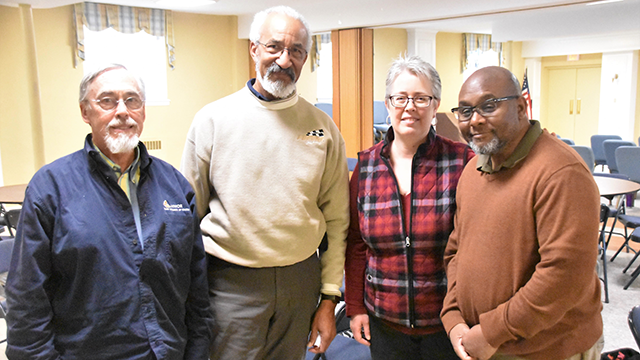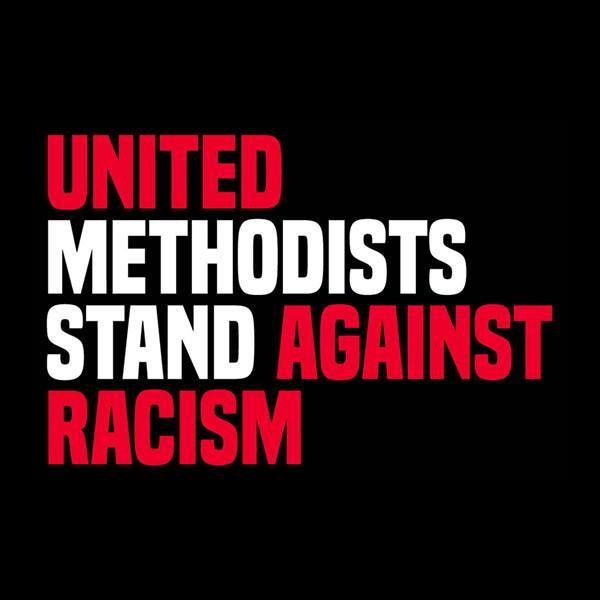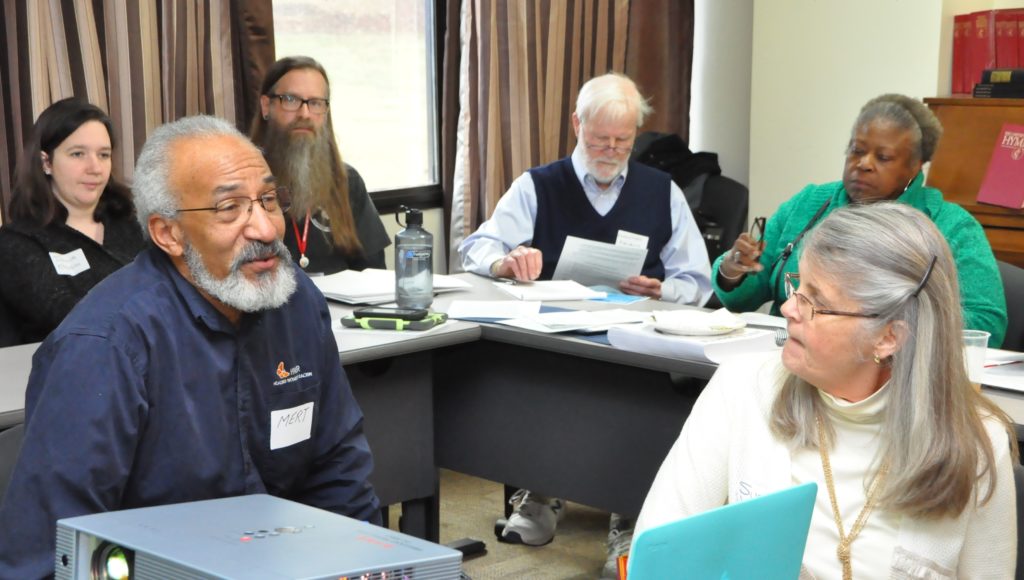
By John W. Coleman
The Eastern PA Conference’s primary anti-racism training program for clergy and lay leadership has been through numerous changes in over two decades of operation; and now it will undergo one more. Three upcoming Dismantling Racism training events—levels I and II—will both happen online for the first time, thanks to the COVID-19 pandemic that has prompted many ministries to safely use Zoom video-conferencing for meetings and training events.

Dismantling Racism I—the required, basic course—will happen on Zoom Oct. 23-25. But it will be divided into multiple, roughly 3-hour segments with breakout rooms to accommodate the challenges of learning and engaging in difficult conversations through video-conferencing and webinars. The weekend class is now full with 18 registrants. Moreover, Visions, Inc., which facilitates the training, has already informed Conference leaders that all of its 2021 training events will also be done online.
A half-day Dismantling Racism II class, also on Zoom, happened Sept. 19, with a focus on the “The Experience and Impact of Racism on People of Asian Ancestry.” The Rev. Doris Kung Chi Pui Dalton, Director of Leadership Development and Intercultural Competency in the New York Conference, keynoted the interactive discussion. Dalton is a deacon and former Eastern PA Conference staff member.
All Eastern Pa active clergy, Certified Lay Ministers and Conference staff are required to take the basic anti-racism course once, plus a Level II Dismantling Racism training each quadrennium.

Healing the Wounds of Racism
Dismantling Racism I—formerly Changing Racism—gained a new name, new oversight and some new curriculum changes in 2019. But the new oversight is from an old source. The Healing the Wounds of Racism Accountability Core Team, which created an anti-racism course by the same name in 1996, had been acting in a limited advisory capacity for several years until its revival last year.
As co-conveners of Healing the Wounds of Racism (HWR), the Rev, David Brown, a retired elder, and Mert Shane, a Certified Lay Minister and pastor, proposed the Dismantling Racism name change to more accurately reflect the ultimate training goal—not to change racism but to dismantle it. And in taking over its supervision from the Conference’s Commission on Religion and Race (CORR), they have introduced some curriculum changes requested by the Board of Ordained Ministry, which licenses and ordains candidates for ministry.
HWR trainings began after the 1996 Annual Conference passed its Plan toward the Elimination of Racism within the Eastern PA Conference. Brown and Shane, the core team’s only original members, recall having accountability teams for Euro-Americans and People of Color, four to five trainings each year and even special trainings for youth. Local “covenant groups” would organize in communities across the Conference to discuss issues from their local perspectives and engage in other activities together. Dody Matthias, Wanda Lofton, Hilda Campbell and others provided dedicated leadership as the program grew and helped the conference become more inclusive in its mission and leadership.
New leadership, new training style
But changes in leadership, staff involvement and funding led to changes in the program, Brown recalls. Bishop Peggy Johnson brought in Visions, Inc., which revamped the training, renamed it Changing Racism and offered what some considered a gentler, less confrontational experience. Veteran “diversity and equity education consultants” Sarah Stearns and Gene Washington have facilitated the Conference trainings for Visions, Inc., ever since.
“We struggled with the (Changing Racism) title for years,” said Brown, who saw the new curriculum as “more generally about personal intercultural competence and cross-cultural communication,” and less about the harsh realities of historical and institutional racism. To address those realities, CORR worked with Brown and Shane to develop a follow-up, one-day learning experience, dubbed “Continuing the Conversation,” in 2017.
“I would guess that a majority of our White congregations do not really know our racial history,” Brown lamented. “And being in denial about that history,” added Shane, “helps many people avoid the pain of that knowledge.”
Indeed, our racial history as a church is a past that is still very present and still in need of healing. The Conference seems to acknowledge that fact with recent enterprises that include:
- a 2018 institutional racism audit, part of an overall Racial Justice Transformation Process;
- pursuit of perhaps the most ambitious and active efforts to fulfill the Northeastern Jurisdiction’s Call to Action racial justice and reconciliation initiative;
- increased efforts to promote and support cross-racial/cross-cultural pastoral appointments; and
- endorsing racial dialogues in all its districts, plus the Whites Confronting Racism program (see related story), and the upcoming Racial Trauma and Transformation workshop for People of Color who have struggled with the lasting effects of racism in their lives and ministries.
Moreover, at BOOM’s and HWR’s request, Visions, Inc., has incorporated new content in the newly named Dismantling Racism I trainings, which typically draw about two dozen diverse registrants, although more participants of color are always desired. That new content includes more instruction about internalized racial oppression, the hazards of implicit bias and other topics clergy and lay ministers need to know as they engage in “making disciples for the transformation of the world,” to cite the denomination’s mission and motto. Some of that new content is drawn from the General Commission on Religion and Race’s Vital Conversations video discussion series.
Teaching the history of racism
“Visions, Inc., has always been cooperative in accepting suggestions and is always researching and using new resources in its trainings,” said Brown. He and Shane now provide a PowerPoint presentation on the history of racism in the U.S., the UMC and the Eastern PA Conference as part of each training.
The renewed HWR core team now meets several times a year to plan and review Dismantling Racism (DR) trainings. The upcoming DR II sessions are part of a series that focuses on the lives and concerns of each racial-ethnic group. Other training topics have included racist “micro-aggressions” that People of Color experience daily in America.
And as DR training events go strictly online for the foreseeable future, Brown and Shane must video-record their presentations to be viewed in advance by participants.
“This will be another step into new territory for us in the ongoing journey toward racial justice and equity,” said Brown. “But it is further proof of the Conference’s steadfast commitment to dismantling racism and helping our members to become the Beloved Community, more united in Christ’s love and transformed by the renewing of our minds.”
